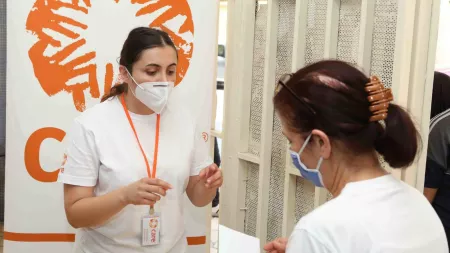Photo: ©2020 Milad Ayoub/CARE
BEIRUT, 28 October 2020 – In the aftermath of the Beirut Port explosion on August 4, women in female-headed households, living within the explosion range, are suffering increased vulnerability. The effects of economic turmoil, greater risks of gender-based violence and the constant struggle to access assistance are highlighted in a new study, “Rapid Gender Analysis of the August Beirut Port Explosion: An Intersectional Examination,” by ABAAD, CARE International, ESCWA, UNFPA, and UN Women. The five organizations call for the scaling up of tailored assistance to marginalized groups, specifically, female-headed households, who make up 51% of the affected population, and elderly women living alone, comprising of 1 in 12 households.
The joint Rapid Gender Analysis (RGA) of the Beirut Port explosion assesses how diverse women, men, girls, boys, and gender minorities have been affected by the explosion on August 4, examining the specific impact on women of diverse nationality, socio-economic background, legal status, ability, age and sexual orientation. The assessment gathers primary data from interviews with 49 responders and affected members of the community, and analyzes 45 existing reports and assessments, including a survey by the Lebanese Red Cross of over 17,000 households.
How have women and girls been affected by the Beirut Port explosion?
- Women with increased vulnerabilities are a sizable portion of the affected population, with 51% identifying as female-headed households and 8% as elderly women living alone.
- Destruction of people’s homes and shelter is exacerbating risks of gender-based violence and the mental health impact of losing one’s home, identity and safe space.
- Women and marginalized groups continue to have an urgent need to access health services – especially first aid. At the same time, discriminatory practices and fear of harassment or abuse are deterring some women from receiving equitable humanitarian assistance.
- The explosion has reduced availability and access to reproductive health services for households with pregnant and lactating women, whereby 40% of them reported needing healthcare in support of infants and mothers[1].
- Feelings of despair and hopelessness, anger, frustration, agitation, and anxiety are reported to be exponentially growing amongst responders of all identities.
“People in Beirut have suffered enormous losses due to the recent Beirut Port explosion. This crisis has come on top of an existing economic crisis, where over half a million jobs were lost, and the COVID-19 pandemic. Risks of multiple forms of sexual and gender-based violence have increased as a result of the explosion. Female-headed households, persons with disabilities, Syrian refugees, and marginalized groups, particularly migrant workers and gender minorities, are particularly at risk. In the absence of a strong government response, they are highly dependent on aid and in need of protection and support. It is of utmost importance that aid organizations continue to reach vulnerable people during these challenging times,” said Bujar Hoxha, Country Director of CARE International in Lebanon.
The study warns that women are experiencing a significant decline in employment opportunities. This is related to the loss of a fairly high number of women-led businesses in the explosion radius, estimated at 1 in 5, and exclusion from economic opportunities in the reconstruction and recovery process. Female migrant domestic workers are particularly impacted by job loss, as many have been abandoned by their employers before and following the explosion.
The joint RGA strongly urges that health services are provided for free, and at home, for those who unable to access on-site services. It also recommends that humanitarian staff and response volunteers are trained on the basic protocols and principles of dealing with gender-based violence and sexual exploitation and abuse.
ENDS.
Notes to editors:
- CARE International in Lebanon supports the most vulnerable Lebanese people and Syrian refugees. Since the recent Beirut explosion, CARE teams have continued to providing humanitarian assistance on multiple fronts across the country: emergency distributions (food and hygiene products), clean water, initiatives to raise awareness of barrier gestures, support to economic development via support programs for income-generating activities, psychosocial first aid and PSS support, and shelter and housing support.
- About CARE:
Founded in 1945, CARE is a leading humanitarian organization fighting global poverty and providing lifesaving assistance in emergencies. In 100 countries around the world, CARE places special focus on working alongside poor girls and women because, equipped with the proper resources, they have the power to help lift whole families and entire communities out of poverty.
For interviews, please contact:
Patricia KHODER, Communications and Media Manager, CARE Lebanon, [email protected], +961-3-520-119.
Laury-Anne BELLESSA, Communication and Media Manager, CARE France, [email protected], +33-6-24-61-85-37.
[1] According to the Lebanese Red Cross (LRC)-led Multi-Sectoral Needs Assessment (MSNA), surveying over 17,500 households.
